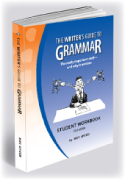|
newsletter — June 1, 2015
Teaching Shakespeare to your kids
What I've learned
 by Roy Speed by Roy Speed
I'm a homeschooling dad who, just over a year ago, began teaching Shakespeare online. What I'd like to do here is give you a sense of what it's been like for me to hang out with your kids in these online sessions.
But first —
To those of you who entrusted your students to me, please know that I am honored to have been their teacher.
Pleasant surprises
In my online classes with your students, the thing I've found most astonishing is the sheer pleasure they take in reading Shakespeare. Among the things they have told me:
- I had absolutely no idea how fantastic an author Shakespeare actually is.
- What I found most surprising was how much I love reading Shakespeare just to read Shakespeare.
- I used to think of Shakespeare as drab and solemn. In this class I discovered that he could be anything from absolutely hilarious to heartbreakingly sad.
What makes such reactions astonishing to me is that what we do in these classes is really hard; reading Shakespeare is an intellectually intense endeavor. Our most common activity: close reading — i.e., I put a passage from the play onscreen and we go through it line by line, sometimes word by word. I emphasize what you might call a historical approach, continually providing the specific Elizabethan context of Shakespeare's language, images, ideas, values, and so on. We even review how English was pronounced in Shakespeare's day — for instance, the word feast rhymed with best, deriving from the same root as our word festival. And all this background information enables the students to assemble in their minds an accurate picture of what's being said, thought, felt by each character in each scene. The point is, your students find this activity exciting. In fact, when I ask them what they most enjoy in these courses, the most common answer is The close reading. — Typical comments:
- The thing I enjoyed most in this course was going through Romeo & Juliet line by line. I felt this technique gave me the best understanding of Shakespeare's writing and was very interesting.
- [In the series on Macbeth] I most enjoyed the close reading — it helped me understand the parts I couldn't figure out on my own (which was quite a bit).
 I always like the close reading — especially the more difficult passages. You do a wonderful job of analyzing every speech, line, and word to make sense. It really comes to life when all the double meanings of words and the historic context are explained fully. I always like the close reading — especially the more difficult passages. You do a wonderful job of analyzing every speech, line, and word to make sense. It really comes to life when all the double meanings of words and the historic context are explained fully.- I learned that I can actually decipher Shakespeare!! I have tried before, and it's extremely difficult to understand all the puns and jokes, as well as the general meaning of certain words. With this class I could ask questions, get the opinions of other students, and really dig into the true nature of each character!
A frequent lament I heard from the students was that we hadn't the time to go line by line through every single scene of each play.
Shakespeare on film
For many of the students, the second most pleasurable activity is watching movie clips — that is, watching film performances of scenes they've just studied in great detail.
For Romeo & Juliet, I assign as homework, in its entirety, the 1968 film directed by Franco Zeffirelli. But by the time the students take my course on Hamlet, they're in a quite different place: they're more discerning, ready to see the same scenes performed in different ways. So I post clips from three different Hamlets — Zeffirelli's 1990 version with Mel Gibson in the title role, the Kenneth Branagh 1996 film (which Branagh both directed and stars in), and the 2009 PBS production with David Tennant as Hamlet. I would assign viewing various scenes as homework — scenes the students were already intimate with from their close reading.
Upcoming Shakespeare Intensives
At a glance
Romeo & Juliet
- Summer Session: July 6 – August 6, 2015
- Fall Session: August 26 – October 28, 2015
Hamlet
- Fall Session: September 12 – November 10, 2015
Please note: This will be our only Hamlet series in the 2015-16 school year.
Macbeth
- Fall Session: November 4 – December 16, 2015
To learn more about a particular course or series, please click on the title of the play.
Such assignments invariably result in
lively discussions and debates in class, especially about specific choices made by actors and directors when staging particular scenes. You see, by the time your students watch a movie version of a scene, they've already "staged" it in their minds — so they approach it with strong opinions and expectations, with their own distinct taste fully formed. They notice and often express disappointment that many lines, entire speeches, entire scenes are cut. When comparing competing versions of the same scene, they're often incredibly articulate about what they feel worked and didn't work in each version.
A personal note
I'm certain that I derive as much pleasure from these classes as the students. The classes require intense preparation, but it's preparation that I love; if I didn't have a day job, I would devote even more time to Shakespeare. Each class, moreover, is ninety minutes long but feels like no time at all — and I know the kids share this experience, because they say so in the chat: Wow. That went fast…
Also, for the Romeo & Juliet series, we devote ten classes to a single play — a luxury unthinkable for most high school English classes — yet the final class of each series, for both me and the students, is always tinged with regret that it's over. It always feels too short.
Just one final point:
Looking back on what I've written here, I see that again and again I've referred to the pleasure we find in these classes — and that's no accident. When studying literature becomes an academic chore, devoid of pleasure, it's a sign that something's gone terribly wrong. It's worth remembering that no writer ever produced a play or a poem or a novel anticipating that it might one day become a source of tedium for thousands of students in high school English class.
My aim when teaching Shakespeare is twofold:
- first, that students understand with real precision what he wrote;
- second, that they see so clearly what Shakespeare was doing that they experience awe at his accomplishment, and the reading experience itself bursts into the realm of pleasure.
In the humanities generally — and with literature, in particular — pleasure often signals that real learning is taking place.
Not on our mailing list? — Adding yourself is easy; just go here.
|
|
|
View all our online courses here.
Eight weeks, in depth, live & online
Twice weekly sessions for two semesters
Twice weekly sessions for two semesters
- March 7, 2020: Beyond the Tour: Getting the most from your college visits
- July 29, 2019: Advocating for oneself, Part 2: College admissions essays & interviews
- May 29, 2019: What our students aren't taught about grammar
- May 16, 2017: Advocating for oneself (Part 1 of 2)
- July 20, 2016: The development of adolescent minds
- December 24, 2015: The appeal of videogames—and the hazards they bring
- August 16, 2015: Three skills your student needs to develop before college (Part 1 of 3)
- July 3, 2015: How literature is now taught in college—and why enrollment in literature courses is in steep decline
- June 1, 2015: Teaching Shakespeare to your kids: What I've learned
- Dec 28, 2014: Extracurricular activities, Part 2
- July 27, 2014: Levels of annotation —
Annotating the text, Part 2
- July 15, 2014: Extracurricular activities, Part 1
- July 2, 2014: Teens need to be together… An innovative solution
- June 9, 2014: The college admissions racket — Getting things into perspective
- June 2, 2014: Building good study habits
— Annotating the text, Part 1
- April 8, 2014: Building good study habits
— Close reading
- March 18, 2014: Why all our students must study Shakespeare
- Feb 25, 2014: Standardized tests, Part 2
- Feb 18, 2014: Standardized tests, Part 1
- Feb 1, 2014: Advanced mathematics
|
|
Shakespeare Intensives
Close reading of Shakespeare
Ten online sessions of 90 minutes
Ten online sessions of 90 minutes
Seven online sessions of 90 minutes
An introduction to Shakespeare's comedy
Eight online sessions of 90 minutes
ONLINE: English Language Arts
— Now open for registration —
Weekly online class
in the essentials of English
 This two-semester course is taught by the author of The Writer's Guide to Grammar. It puts in place skills and knowledge foundational to the study of English and the mastery of clear writing. The weekly class is live and online, and students master all the most important principles of the English language — grammar, usage, punctuation, and more. This two-semester course is taught by the author of The Writer's Guide to Grammar. It puts in place skills and knowledge foundational to the study of English and the mastery of clear writing. The weekly class is live and online, and students master all the most important principles of the English language — grammar, usage, punctuation, and more.
Online Writing
Two semesters of online classes
Two classes per week
Online Literature
Two semesters of online instruction
Training for parents
Now an online series!
This program addresses the principal concerns parents have about homeschooling through high school — curriculum and credits, standardized tests, transcripts and record-keeping, the application process, pursuing scholarships, and more.
Terrific. Full of information. The materials were so thorough. I now have a plan of action. Also, this workshop is inclusive: No matter what type of homeschooler you are, you will understand better how to prepare your student for college and present him or her in the best light.
Mother of two
|
|
![]()